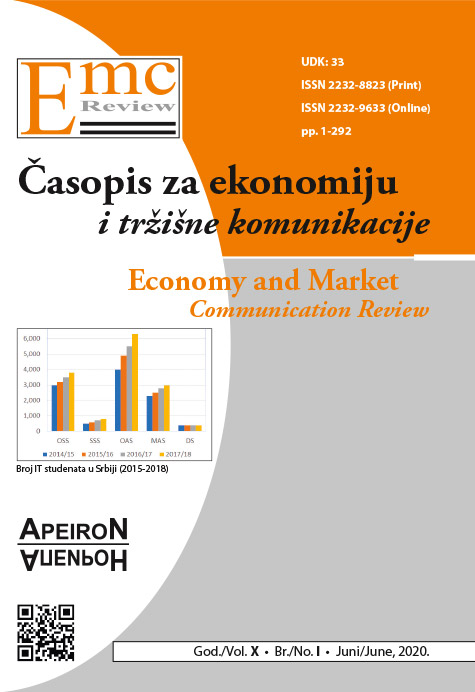Pyramid of Corporate Social Responsibility in Bosnia and Herzegovina: The Case of Consumers of Small and Medium Enterprises
DOI:
https://doi.org/10.7251/EMC2001103KAbstract
Corporate Social Responsibility represents the voluntary and expressed concern of the company towards itself and its employees and towards the environment in a way to avoid or to minimize the negative consequences of its activities and to encourage, improve, and invest in its own development and development of the society. As Bosnia and Herzegovina belongs to a group of countries in development with a traditionally rooted philanthropy, we expect that the presented results of this paper will contribute to the reduction of the literary gap that had arisen from the lack of researches that have in its context corporate social responsibility, consumers and small and medium enterprises in such countries. The main purpose of this paper is to analyze the ranking of responsibility from the pyramid of corporate social responsibility from the aspect of small and medium enterprises consumers in Bosnia and Herzegovina. Particularly, this paper analyzes the difference in the priorities and the achieved mean values of economic, legal, ethical and philanthropic responsibility with respect to gender, whether the consumers in the environment know the company that operates ethically and socially responsibly, and respect to the material situation of consumer's household. Based on the research results, it can be concluded that consumers give priority to the philanthropic responsibility, i.e. in this research the redistribution of the importance of certain responsibility dimensions from the Carroll's pyramid of corporate social responsibility has not been confirmed. Statistically significant and positive values of Pearson correlation coefficient show us that economic, legal, ethical and philanthropic responsibilities are interconnected. There is no difference in the achieved mean values of economic, legal, ethical and philanthropic responsibilities with respect to the respondents’ gender (although there is a difference in the ranking of responsibilities). The highest mean values of the stated responsibilities have been achieved among the respondents who rated their material household status as "Much worse than the average", while the difference in the achieved mean values is statistically significant only for the legal and philanthropic responsibility in favor of consumers who had rated their household material condition as much worse than the average compared to those who had rated the household material condition as much better than average. Also significant mean values are noticable among respondents who know in their surrounding enterprises that are ethically and socially responsible, although statistically significant difference exist only with philanthropic responsibility.
The results achieved in this research support the claims that in developing countries as well as in countries with traditionally rooted philanthropy priority is given to philanthropic responsibility compared to others.
